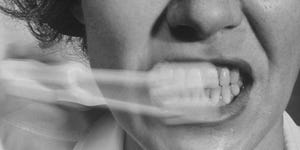
You and your tongue go way back, so you probably have a pretty solid idea of what it should look like on a daily basis. So, if you noticed that your tongue was suddenly hairy and black, it’s 100 percent understandable that you might completely freak out.
That’s what happened to one unidentified woman who wound up in a medical journal. According to the New England Journal of Medicine, the 55-year-old woman went to the hospital after she had a “severe crush injury” to both legs in a car crash.

The New England Journal of Medicine ©2018.
She developed an infection and received IV antibiotic treatment (specifically, a drug called minocycline) for it. But a week later, she had nausea, a bad taste in her mouth, and her tongue turned black and formed little hairs on it. Her doctors suspect that the minocycline was to blame.
This is actually due a condition called black hairy tongue, the doctors wrote in the case report.
Hold up, black hairy tongue? What is that?
This a benign (so, harmless…although freaky AF), temporary condition that, basically, causes your tongue to get black and hairy.
Black hairy tongue occurs due to a lack of stimulation on the the top of the tongue, resulting in a buildup of a protein called keratin (yep, that’s the same protein that makes up the hair on your head), according to the Genetic and Rare Diseases Information Center (GARD).

The buildup of that keratin can become pretty damn long, giving off the appearance of, well, hair. And the longer it gets, the more likely it is that it’ll trap and get stained by bacteria, yeast, and food that accumulate in your mouth, per The American Academy of Oral Medicine (AAOM).
But, fun fact: Black hairy tongue doesn’t always appear black—it can also appear brown, white, green, or pink, depending on what you put in your mouth (like mouthwash or candy), says the AAOM.
Are there any other symptoms other than, you know, a black hairy tongue?
Not usually, per the AAO—though sometimes you can feel a burning sensation on the tongue, due to bacteria or yeast accumulation (cute).
If the keratin buildup gets long enough, though, it can cause a gagging or tickling sensation on the roof of your mouth when swallowing, as well as bad breath (a.k.a. halitosis) and a weird or metallic taste in your mouth, per the AAO.
Umm, how can you get black hairy tongue?
Apparently this isn’t an entirely uncommon thing—about 13 percent of the population will have (or has had) black hairy tongue, says the AAO.
While black hairy tongue can occur anytime, and in anyone (though it gets more common as you age), certain lifestyle factors like alcohol or tobacco use, dehydration, and poor oral hygiene, as well as using certain medications like antibiotics can increase your risk, per GARD. Radiation treatment to the head and neck area, as well as a soft diet due to lack of teeth can also bring on black hairy tongue, per the AAO.
So what’s the treatment for black hairy tongue (a.k.a., will it go away)?
Again, because black hairy tongue is temporary, it can resolve on its own—though your doctor will encourage you to avoid those risk factors that can cause it (in the woman’s case above, she was taken off the antibiotic minocycline and put on another antimicrobial treatment). You’ll also have to start being diligent AF when it comes to your oral hygiene routine (brush twice a day, please—and don’t forget your tongue, for God’s sake).

In some cases, though, antifungals, retinoids, or medicated mouthwashes can be prescribed to speed up healing. And in super-rare cases, those long hairs can be clipped or removed.
Luckily, after switching her medications, this woman’s black hairy tongue went away in four weeks, returning to it’s normal pinkish color. Let’s hope it stays that way (once you’ve had black hairy tongue, it increases your risk of getting it again). The more you know!
Source: Read Full Article
